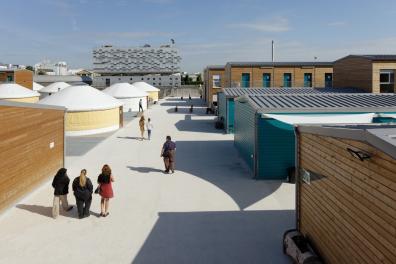Field notes on the economics of social relations at the Ivry emergency shelter

In the debate raging in Western societies over the reception of refugees, the operation of emergency accommodation centers (CHU) in France, in a magnifying glass effect, provides answers as to how these societies interpret this dark facet of cross-border mobility and a temporality defined as "urgent" in its relationship with variable geopolitical spaces. This article opens this debate from an ethnographic observation in progress, that of an open university hospital in the southern Paris suburb of Ivry.
The "model" function of the CHU in Ivry
The Ivry emergency accommodation center for refugees aims to be the counter-example to the "Calais Jungle", which housed around 7,000 migrants before its evacuation in 2016. Created in February 2017, administratively financed by the City of Paris and managed by the Emmaüs association, the CHU d'Ivry gives concrete form within a controlled structure to the reception of those who are eligible to apply for asylum in France. It is designed to accommodate 400 people, and is equipped with social support including a health center coordinated by Samu social, Pédiatres du monde and Gynécologie sans frontières, as well as a school under the dual supervision of the Paris and Créteil education authorities. It is this school that serves as the basis for the survey project that has been set up[1].
.
Aiming to be an exemplary response to the challenges presented by the reception of people who are destitute, exhausted, destroyed by the mistreatment suffered during their journey, and who have approached the very edge of death, the CHU combines a response to strict hygiene criteria (cottages with sanitary blocks, daily cleaning of the center, medical care, meal service), administrative (registration of individuals and families, monitoring of asylum applications) and social (yurts for group activities, leisure activities run by volunteers, elementary school education for children). As a high-profile site in the media, the CHU receives many requests for visits: from politicians wanting to get a feel for the migratory phenomenon under debate, to journalists feeding their readers' curiosity. Regular visitors to the hospital are thus forced to regulate, or even curb, the latent voyeurism of these requests, which interrupt planned activities and more often than not open the door to exchanges without a future.
A School of the Republic directly confronted with a globalized reality
Initially chosen for their skills in teaching French as a foreign language, the teaching team are themselves mirrors of those they welcome. Expected linguistic skills in English "globish " or Arabic, determine particular sociological teacher profiles that are rarely valued in the French education system: the experience of cross-border mobility or exile, a multilingual capital forged at school or through successive expatriations, proven training in French as a foreign language build the particular ability of these teachers to hear the intensity of children's experience. In line with their own personal histories, the teachers are in solidarity with their pupils, welcomed for a time in the center, then sent out to the provinces by an administrative decision experienced as brutal, while the children experience a new break in a constantly choppy career path. For the teachers, the arbitrariness of political and administrative measures is at odds with the children's future. The teaching team is sometimes led to see itself as an actor acting against its will, against the interests of the young people they protect, and faces a conflict of loyalties between personal history and the decisions of the state that hired them.
The elementary school on the site is a space marked by a layered temporality that gives the term "emergency" multiple, and sometimes contradictory, meanings. While for the French state, urgency refers to its historic mission of fulfilling humanitarian law, it is also a question of remedying the delays in processing files aimed at establishing the legitimacy or otherwise of asylum applications. The law entitled Asile et immigration, definitively adopted in August 2018, reduces decision times. The urgency of the adults and children housed is measured by their ability to regain a foothold after a journey scandalized by separation and loyalty to the family left on the grounds of violence, after the tragedy of persecution suffered during the journey. For families, the stay at the center is a time of uncertainty, inactivity and immobility, until decisions are communicated, the mechanism of which the families do not always understand. A parenthesis where life is suspended. The teachers' urgency is linked to the flow of children, carried away by a distant administrative decision, escaping the principle of an ordinary school scandalized by programs, terms and homework. At the emergency shelter, the temporary is the fragile response to expectation and hope.
Geneviève Zarate
[1] Project Around language in emergency situations: between learning and teaching. A field study in an emergency shelter (2018-2020). Project leaders: Geneviève Zarate, emeritus university professor at the Institut national des langues et civilisations orientales (Inalco), Paris, president of Transit-Lingua; Catherine Berger, senior lecturer, vice-president of Transit-Lingua; co-leaders. Participants: Geneviève Baraona, professeur agrégée de Lettres, docteure en sciences de l'Éducation ; Catherine Gottesman, professeur agrégée de Lettres classiques ; Christophe Portefin, director of Accentonic, a training organization specializing in socio-professional integration ; Elli Suzuki, lecturer at Bordeaux 3 University, Japanese studies.